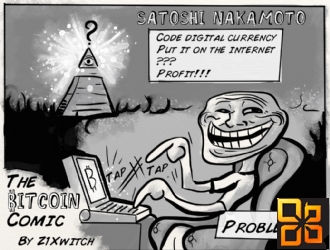Bit O’Money: Who’s Behind the Bitcoin Bubble?

 It was a tweet from a stranger that crystallized the concept of Bitcoin for Bruce Wagner. “I can explain the benefit of Bitcoin in four words,” one of Mr. Wagner’s 12,000-some Twitter followers wrote. “Briefcases full of cash.” It was a tweet from a stranger that crystallized the concept of Bitcoin for Bruce Wagner. “I can explain the benefit of Bitcoin in four words,” one of Mr. Wagner’s 12,000-some Twitter followers wrote. “Briefcases full of cash.”
At the time, briefcases full of pennies seemed more apt—one unit of the new virtual currency was then worth $0.06. Then, in one day, the price of a Bitcoin jumped to $0.22. Mr. Wagner, a former I.T. specialist who now produces and stars in his own web TV shows, became obsessed with the things. He sat at his computer, too excited to eat, reading the myriad white papers, trade blogs, technical analyses and forum discussions about Bitcoin. For five days, he hardly slept. He just kept thinking, This is amazing. This is going to change everything. The last time he’d been this excited was when Windows came out. He got his hands on some Bitcoins and sold when the price doubled. It kept climbing. He invested more. Bitcoin is Internet gold, a digital currency developed by a community of programmers in 2009 that represents the first plausible manifestation of an unregulated global “cryptocurrency” first imagined by anarchist computer hackers in the late 90’s. Bitcoins are snippets of code that use encryption to prevent counterfeiting and double-spending. Complex algorithms control the money supply, in theory replacing the need for banks or a central regulator. Right now Bitcoins can be generated—or “mined”—by running a program on a powerful computer. This task requires exponentially more time and processing power as the number of Bitcoins grows, and the absolute number of Bitcoins is capped at 21 million, mimicking the scarcity of gold. There are now 6,539,450 in circulation; $2 million worth were traded on the main Bitcoin exchange Mt. Gox on Friday. The price of a Bitcoin climbed slowly but steadily until May, when Gawker and the tech blog Launch published two big stories about the phenomenon. Prices started zigzagging up, hitting a high of $33.11 last week after three weeks of increasingly frenzied trading, and then fell a spectacular 30 percent Friday morning, what the blogs dubbed “Digital Black Friday.” As of now—3 p.m. Tuesday—a Bitcoin can be had for around $18. As with gold, the number of things one can purchase with Bitcoin is limited. There are 64 listings on BitGigs.com, a recently launched job board for buyers and sellers who want to do business in Bitcoins, and a few dozen more on Bitcoinclassifieds.net. Some programmers in New York created an app for Android phones that allows users to trade Bitcoins on the spot. A few start-ups have listed on the Global Bitcoin Stock Exchange, an experimental market for bonds and private companies. There are websites that allow you to purchase ground coffee or alpaca socks with Bitcoin. Meze Grill on 55th Street and Eighth Avenue, “where authentic Mediterranean food meets modern flavor,” accepts Bitcoin, as does the Fetish Fortress, a bondage dungeon in Chinatown. Bitcoin appeals primarily to computer geeks, who love it for its technical elegance. It has also found fans among libertarians and populists, because it circumvents banks and governing authorities; digital natives, because it simplifies peer-to-peer payments; and law-breakers of various kinds, because transactions are untaxed and difficult to trace. Most of the activity around Bitcoin right now is pure speculation, however, due to the violent price fluctuations and limited adoption by merchants. The Wall Street Journal’s SmartMoney blog trumpeted “The Currency That’s Up 200,000%.” One German coder who frequents Bitcoin forums claims investors gave him $500,000 to build a data center to mine Bitcoins; a programmer posting on Reddit emptied his bank account and maxed out his credit cards in March to buy $10,000 worth of mining equipment. (“Within three months of finding Bitcoins,” he wrote, “it has completely consumed my entire life, all of my ‘money,’ and I am loving every minute of it.”) One college student sustained permanent minor brain damage due to heatstroke after he dozed off in his room next to four computers furiously mining Bitcoins. “I wish I was joking,” he said in a forum post that was reposted on the website BitcoinMiningAccidents.com. Rick Falkvinge, founder of the Swedish Pirate Party, declared he was putting all his savings into Bitcoin. [Web bonus! Check out this video of an exhaust system built for a Bitcoin mining rig.] According to Larry White, an economics professor at George Mason University who specializes in monetary theory and banking, Bitcoin is essentially “a floating exchange rate against other currencies.” He added with some amusement, “It does seem to have some purchasing power, or at least some expectation of having some purchasing power, and so it seems to have lifted itself by its own bootstraps into having a positive value.” Bitcoin enthusiasts believe the currency will rival the dollar, so the fact that the ultimate supply is fixed makes it a sure bet. Dr. White isn’t so sure. The currency simply doesn’t offer enough advantages over traditional currencies to compel the average person to switch. “I’m having trouble figuring out the practical business case for it going mainstream,” he said, “unless the U.S. dollar becomes much more unstable.” Sounds plausible to us! Under that scenario, if Bitcoin were able to present a more stable alternative, the cryptocurrency would be “healthy competition for the dollar,” Dr. White said, adding, “This is, by the way, the same thing I said about the Liberty Dollar.” The Liberty Dollar was a private currency minted in Idaho and used by at most a quarter million people between 2007 and 2009, during which time its value doubled in relation to silver. It came to an ignominious end when the federal government arrested its creator, among others, and declared the operation a federal crime. E-gold, a digital currency backed by real gold, met a similar fate when the U.S. Department of Justice charged its creators with money-laundering. As for Bitcoin, Senator Chuck Schumer began agitating for a crackdown on the currency after it was used to buy various illegal drugs on the underground website Silk Road. A Bitcoin ban would be tough to enforce for the same reasons music piracy has been impossible to stamp out. But the government has enough tools at its disposal to prevent Bitcoin from becoming mainstream, Dr. White says. There are also concerns about the currency’s technical integrity due to a story spreading about one Bitcoin investor who says he lost almost half a million dollars’ worth of Bitcoins to a hacker. |

 [上两篇] MyBitcoin Spokesman Finally Comes Forward: “What Did You Think We Did After the Hack? We Got Shitfaced” Upcoming Bitcoin Conference and World Expo Upgrades Venue
[上两篇] MyBitcoin Spokesman Finally Comes Forward: “What Did You Think We Did After the Hack? We Got Shitfaced” Upcoming Bitcoin Conference and World Expo Upgrades Venue [下两篇] The Feds Are Contemplating a BitCoin Crackdown. Who Should They Police First? MyBitcoin.com Is Back: A Week After Vanishing With at Least $250 K. Worth of BTC, Site Claims It Was Hacked
[下两篇] The Feds Are Contemplating a BitCoin Crackdown. Who Should They Police First? MyBitcoin.com Is Back: A Week After Vanishing With at Least $250 K. Worth of BTC, Site Claims It Was Hacked

 网友评论
网友评论


 @好耶网络
Processed In:-0.3594-Seconds, CMS-12Queries-Amazon Web Services
@好耶网络
Processed In:-0.3594-Seconds, CMS-12Queries-Amazon Web Services












 您的位置:
您的位置: 【】
【】